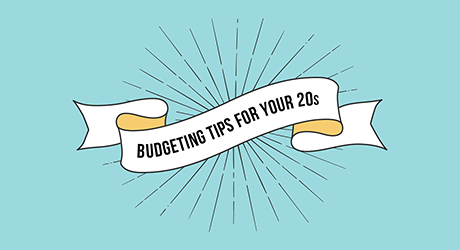Your 20s are an exciting decade for change and growth; from graduating from college, to investing in higher education, to getting your career off the ground and, perhaps, making serious plans to start a family. Of course, there can also be financial difficulties. Being a 20-something usually means supporting yourself for the first time while balancing lingering student loan debt and earning an entry-level salary. All of this can make it difficult to budget – but it’s certainly not impossible, and by putting good budgeting habits into practice now, you’ll be better equipped for all the decades that come next. Here are a few key budgeting tips that every 20-something should keep in mind.
-
Make a Budget
The first budgeting tip every 20-something needs to know is a no-brainer – make a budget! But this can be easier said than done. When you’re still studying, or living paycheck to paycheck, or subsisting on an intern’s stipend, it can seem pointless (or even impossible) to make a budget and stick to it. And yet, by developing good financial habits now, you’ll be better equipped to manage your finances for many, many years to come. Download a budgeting app to help you track what money is coming in and going out, and divide your funds in terms of fixed expenses like housing and food, and variable expenses such as eating out or going to the movies with friends. It’s also a great idea to start setting aside some money for financial goals, like paying off debt or boosting your savings.
-
Automate Your Savings
You can’t achieve true financial security without a cushion of savings. Having this money set aside is key to helping you pay off debt and reach future financial goals like purchasing your first home or planning for a wedding or a family. To help you easily save, set up an automated savings plan in which you have a special bank account just for savings, with automated deposits every month. That way you don’t have to think about savings – the money automatically flows from your incoming funds such as a paycheck, straight into your savings account. In just a year you’ll be able to see how much you saved, and by the end of your 20s you’ll have a good cushion of money to help you do more in the next decade.
-
Pay Down Your Debt
The sooner you can start paying off your debt, the better. Starting your 30s without debt will give you more freedom to travel, purchase property, or start making serious investments. If you’re feeling overwhelmed by student debt, talk to a financial officer about creating a tailored payment plan that fits your current job situation. Another option is to refinance your student loans. This can help to lower your monthly payments, reduce your interest rate, or simply consolidate multiple payments into one monthly bill to save you time.
-
Keep Up With Your Credit Score
As you move through your 20s, it will quickly become apparent that your credit score has a major impact on your financial life. A good credit score can help you to rent an apartment you love, buy a car, purchase a house, and get better interest rates on a loan or credit card. A poor credit score, on the other hand, could stand in the way of making important purchases and might lead you to spend more money in the long-run by preventing you from getting the best deals on financial products. It doesn’t cost anything to see your credit score, so take a look at regular intervals and keep it in good health by paying your bills on time and paying down debt whenever possible.
-
Think Long Term
It’s never too soon to start saving for long-term goals. If you want to be a homeowner by the time you’re 35, make a plan now as to how you’re going to get there. By starting the process in your 20s, you’ll have a head start on the future. And even though it can seem tough to start saving for long-term goals when you’re just starting out in your career and your life, this is actually a great decade to get ahead; before you’re faced with the significant costs of owning a home or starting a family.
Interested in more budgeting tips for a financially happy and healthy 20s? HUECU members get access to a number of financial wellness programs and workshops. Check out what’s on at HUECU.com.
.png?width=258&height=68&name=Harvard_Primary_Logo_Horiz_RGB%20(2).png)




